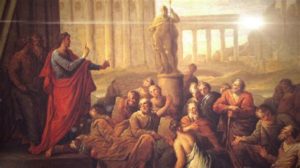 Over the last couple of weeks we have taken a look at the rise of the nones in this country. If you have not read the last two devotions you might want to just to get the context of today’s devotion. We have been comparing the ministries of Peter and Paul in the book of Acts. Peter’s audience was familiar with the Old Testament scriptures, so he used their knowledge in his presentation of the gospel. Jesus, the greatest evangelist, Stephan and Phillip and others did the same thing. On the other hand, Paul spoke to those who had very little understanding of the God of the Old Testament. Paul tailored his gospel accordingly.
Over the last couple of weeks we have taken a look at the rise of the nones in this country. If you have not read the last two devotions you might want to just to get the context of today’s devotion. We have been comparing the ministries of Peter and Paul in the book of Acts. Peter’s audience was familiar with the Old Testament scriptures, so he used their knowledge in his presentation of the gospel. Jesus, the greatest evangelist, Stephan and Phillip and others did the same thing. On the other hand, Paul spoke to those who had very little understanding of the God of the Old Testament. Paul tailored his gospel accordingly.
In Acts 17 Paul was waiting in Athens for Timothy and Silas to help him  deliver the message of the gospel, but as he looked around at the incredible idolatry of the city he was moved to begin his preaching alone. He preached in the synagogue first as he always did, and then went to the marketplace. We can be assured that the messages were the same, but that the approach was different in each of these places. In the synagogue he was speaking to those who understood his message even if they did not agree with it completely (like the population in the U.S. thirty years ago). In the marketplace he was speaking to the common Athenians who were going about their daily lives probably unconcerned about things spiritual (like the people in the U.S. today). We do not know his exact speech in those two locations, but we do know that it peaked the interest of the local philosophers and got him an invite to the intellectual center of the city, the Areopagus.
deliver the message of the gospel, but as he looked around at the incredible idolatry of the city he was moved to begin his preaching alone. He preached in the synagogue first as he always did, and then went to the marketplace. We can be assured that the messages were the same, but that the approach was different in each of these places. In the synagogue he was speaking to those who understood his message even if they did not agree with it completely (like the population in the U.S. thirty years ago). In the marketplace he was speaking to the common Athenians who were going about their daily lives probably unconcerned about things spiritual (like the people in the U.S. today). We do not know his exact speech in those two locations, but we do know that it peaked the interest of the local philosophers and got him an invite to the intellectual center of the city, the Areopagus.
“Then certain Epicurean and Stoic philosophers encountered him. And some said, “What does this babbler  want to say?” Others said, “He seems to be a proclaimer of foreign gods,” because he preached to them Jesus and the resurrection. And they took him and brought him to the Areopagus, saying, “May we know what this new doctrine is of which you speak? For you are bringing some strange things to our ears. Therefore we want to know what these things mean.” For all the Athenians and the foreigners who were there spent their time in nothing else but either to tell or to hear some new thing.” (Acts 17:18-21)
want to say?” Others said, “He seems to be a proclaimer of foreign gods,” because he preached to them Jesus and the resurrection. And they took him and brought him to the Areopagus, saying, “May we know what this new doctrine is of which you speak? For you are bringing some strange things to our ears. Therefore we want to know what these things mean.” For all the Athenians and the foreigners who were there spent their time in nothing else but either to tell or to hear some new thing.” (Acts 17:18-21)
These two groups might ring a bell to us today. Epicureans pursued pleasure  as the greatest purpose in life. They did not deny the existence of gods, but believed they were inconsequential to their lives. Stoics, on the other hand, were pantheists who believed everything is god, and that there was no such thing as a single, personal god. Between these two groups, we have a slice of our culture today. Many people fit into one of these groups or combined variations of them both. So did Paul pull out his synagog sermon for these men? No. It was a great opportunity to speak at Mars Hill, and he was going to deliver his message in the most effective way possible. He was going to tailor the “delivery” of his message without changing the “heart” of the message.
as the greatest purpose in life. They did not deny the existence of gods, but believed they were inconsequential to their lives. Stoics, on the other hand, were pantheists who believed everything is god, and that there was no such thing as a single, personal god. Between these two groups, we have a slice of our culture today. Many people fit into one of these groups or combined variations of them both. So did Paul pull out his synagog sermon for these men? No. It was a great opportunity to speak at Mars Hill, and he was going to deliver his message in the most effective way possible. He was going to tailor the “delivery” of his message without changing the “heart” of the message.
 These people did not have scriptural knowledge. They knew little or nothing of the old testament stories and prophecies. They probably had not even heard of the Messiah. Had Paul started with those particulars, he would have lost his audience within a few minutes. He wanted to get to his message without losing anyone along the way. So here was his message paraphrased: “I was passing through and looking at your many finely carved idols and came across one with the inscription: To the Unknown God.” Paul connected with the people with something they understood- their own gods from their own culture. Paul continued, “I am here to proclaim to you the unknown God who you acknowledge but do not know.” He then described God in eight beautiful verses that tells what He has done, is doing, and will do in the future.
These people did not have scriptural knowledge. They knew little or nothing of the old testament stories and prophecies. They probably had not even heard of the Messiah. Had Paul started with those particulars, he would have lost his audience within a few minutes. He wanted to get to his message without losing anyone along the way. So here was his message paraphrased: “I was passing through and looking at your many finely carved idols and came across one with the inscription: To the Unknown God.” Paul connected with the people with something they understood- their own gods from their own culture. Paul continued, “I am here to proclaim to you the unknown God who you acknowledge but do not know.” He then described God in eight beautiful verses that tells what He has done, is doing, and will do in the future.
“Therefore, what you worship in ignorance, this I proclaim to you.  The God who made the world and everything in it—He is Lord of heaven and earth and does not live in shrines made by hands. Neither is He served by human hands, as though He needed anything,since He Himself gives everyone life and breath and all things. From one man He has made every nationality to live over the whole earth and has determined their appointed times and the boundaries of where they live. He did this so they might seek God, and perhaps they might reach out and find Him, though He is not far from each one of us. For in Him we live and move and exist, as even some of your own poets have said, ‘For we are also His offspring. Being God’s offspring then, we shouldn’t think that the divine nature is like gold or silver or stone, an image fashioned by human art and imagination.
The God who made the world and everything in it—He is Lord of heaven and earth and does not live in shrines made by hands. Neither is He served by human hands, as though He needed anything,since He Himself gives everyone life and breath and all things. From one man He has made every nationality to live over the whole earth and has determined their appointed times and the boundaries of where they live. He did this so they might seek God, and perhaps they might reach out and find Him, though He is not far from each one of us. For in Him we live and move and exist, as even some of your own poets have said, ‘For we are also His offspring. Being God’s offspring then, we shouldn’t think that the divine nature is like gold or silver or stone, an image fashioned by human art and imagination.
“Therefore, having overlooked the times of ignorance, God  now commands all people everywhere to repent, 31 because He has set a day when He is going to judge the world in righteousness by the Man He has appointed. He has provided proof of this to everyone by raising Him from the dead.” (Acts 17:24-31)
now commands all people everywhere to repent, 31 because He has set a day when He is going to judge the world in righteousness by the Man He has appointed. He has provided proof of this to everyone by raising Him from the dead.” (Acts 17:24-31)
Paul did not approach these men with prophecies that were meaningless to them, and yet did not compromise on who Christ was and is. Although the cross is not mentioned, he spoke to them intellectually and honestly. We can be sure that Luke’s account of the speech is only a partial one because this would only be about a two-minute sermon and no one who got the floor at Mars Hill would squander the opportunity with a two-minute speech, especially Paul. What we do get from this sermon is a nice formula for approaching  unbelievers with gospel. First of all, know where people are before you talk to them- Paul knew he was talking to Epicureans and Stoics and he knew what they believed, so he started there. Secondly, find the need in someone’s life that Christ can fill- Paul knew that they believed in something greater than themselves (they had hundreds of Gods) and used that knowledge to introduce Christ. Thirdly, do not water down the gospel- Paul told of the power and nature of God and ultimately the resurrection of Christ. We are surrounded by “Epicureans and Stoics” today and we cannot expect them to know what we know and treat them like they have grown up in the pews and have just gone astray. They may have never even visited a church.
unbelievers with gospel. First of all, know where people are before you talk to them- Paul knew he was talking to Epicureans and Stoics and he knew what they believed, so he started there. Secondly, find the need in someone’s life that Christ can fill- Paul knew that they believed in something greater than themselves (they had hundreds of Gods) and used that knowledge to introduce Christ. Thirdly, do not water down the gospel- Paul told of the power and nature of God and ultimately the resurrection of Christ. We are surrounded by “Epicureans and Stoics” today and we cannot expect them to know what we know and treat them like they have grown up in the pews and have just gone astray. They may have never even visited a church.
 Today’s churches need to follow Paul’s lead. If Peter would have spoken on Mars Hill, he would not have spoken to them the way he did the Jews in Jerusalem. When Paul spoke to the people in Corinth (his next stop), he did not use the same presentation as he did on the Areopagus. We cannot treat people of this century like the past century. We sometimes try to talk to the people on the street in the same way we visit with our friends in church. We must start where they are, not where we are. We must reach out and speak to others knowing they who we used to be before we knew Christ.
Today’s churches need to follow Paul’s lead. If Peter would have spoken on Mars Hill, he would not have spoken to them the way he did the Jews in Jerusalem. When Paul spoke to the people in Corinth (his next stop), he did not use the same presentation as he did on the Areopagus. We cannot treat people of this century like the past century. We sometimes try to talk to the people on the street in the same way we visit with our friends in church. We must start where they are, not where we are. We must reach out and speak to others knowing they who we used to be before we knew Christ.
The nones are not bad people, just fed-up people. They don’t like organized religion because it too often paints and inaccurate picture  of Christ and a too accurate picture of Christians. If we want the nones to start checking the Christian box, we must give them more than religion. We must give them Jesus. We are Christians, not church-tains, so He must be the focus. We can no longer assume that those around us have any kind of Bible knowledge, so we must start there when conversing about the Lord. As churches, once we get nones in the door, we need to give them huge helpings of Christ, not a few morsels. Only then will they be filled, only then will they come back for more.
of Christ and a too accurate picture of Christians. If we want the nones to start checking the Christian box, we must give them more than religion. We must give them Jesus. We are Christians, not church-tains, so He must be the focus. We can no longer assume that those around us have any kind of Bible knowledge, so we must start there when conversing about the Lord. As churches, once we get nones in the door, we need to give them huge helpings of Christ, not a few morsels. Only then will they be filled, only then will they come back for more.
Leave a Reply